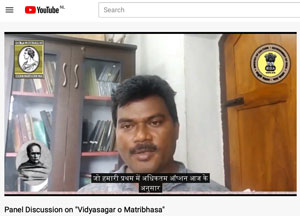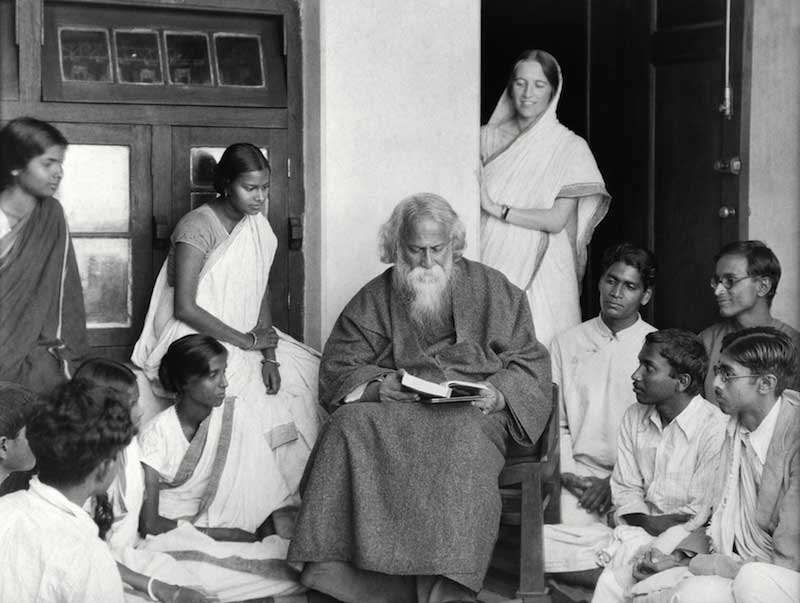
“Vidyasagar Smarane: Adivasi Unnayan O Matribhasa Sikha”
by The Asiatic Society Kolkata on 30/9/2020
coordinated by Dr. Boro Baski >>
Suranjan Das, vice-chancellor of Jadavpur University Kolkata
Vidyasagar did not want to build India based on religion; instead he wanted India to be the melting pot of all cultures […] Vidyasagar symbolised modernity and he dreamt of India emerging as a modern state. His modernity had no connection with any religion […]
Indian culture does not represent one particular religion or cultural trait. It is an assimilation of various cultural traits; it is syncretic in nature. Surely, Vidyasagar was aware of this trait in Indian pluralistic cultural tradition when he sought to consciously detach the modernising process with any religious thinking. […]
We do not know if Vidyasagar subscribed to any religious belief. In none of Vidyasagar’s texts there is celebration of any particular religion. He was averse to the practice of any religious function in an educational institution. What Vidyasagar remained firmly committed to was humanism. […]
At the core of any higher education policy lies the notion of a university. Thinkers — from Immanuel Kant to John Henry Newman, Wilhelm von Humboldt to Rabindranath Tagore and Mahatma Gandhi — had distinguished the modern university from its medieval forerunners by envisaging for it an autonomous sphere in relation to the emerging nation-state. Universities are thus required to be ‘incubators of ideas and innovations’.
Source: “The relevance of Vidyasagar: He wanted a melting pot of all culture” by Suranjan Das, The Telegraph (Calcutta), 30 September 2020
https://www.telegraphindia.com/west-bengal/calcutta/the-relevance-of-vidyasagar/cid/1793177
Date visited: 30 September 2020
Visva Bharati was established […] as part of a unique experiment to have classes not indoors but outside in nature. […]
About religion, [Tagore] wrote, ‘Those who in the name of faith embrace illusion, kill and are killed.’
Source: Atanu Mitra in “Why the decision to cancel historic fairs at Tagore’s university sparked violence and vandalism” (Scroll.in 17 August 2020)
URL: https://scroll.in/article/970959/why-the-decision-to-cancel-historic-fairs-at-tagores-university-sparked-violence-and-vandalism
Date visited: 17 November 2020
[Bold typeface added above for emphasis]

Reports and resources for education and research purposes
Up-to-date reports by Indian journalists and commentators
List of Indian magazines and web portals covered by the present Custom search engine
See also
Audio | Santali Traditional and Fusion Songs: Ghosaldanga Bishnubati Adibasi Trust
Crafts and visual arts | Masks
eBook | Free catalogue: Banam: One of the ancient musical instruments of the Santals
eBook | Free catalogue: Museum of Santal Culture (Bishnubati) – West Bengal
Museum of Santal Culture Bishnubati
Santal | Santal Parganas | The Santals by Boro Baski | Santal music
Santal democratic organisations, customs, history and creation traditions (book tip)
Santali language | eBook | A Santali-English dictionary – Archive.org
Santal mission | Santal Parganas
Santali translations of Rabindranath Tagore’s “Vidyasagar-Charit” and “Raktakarabi”
Teaching Santal children by Boro Baski
Traditional music instruments of the Santals at the Museum of Santal Culture
Video | Roots and Branches: The Lifeworld of an Enlightened Villager in West Bengal
Video | Santali video album “Ale Ato” (Our Village, Part 1 of 2) – West Bengal
Women | Safe search | President Droupadi Murmu on women’s empowerment